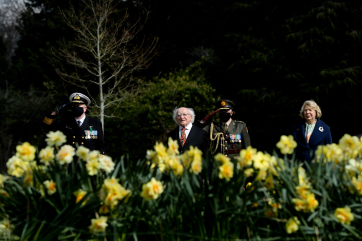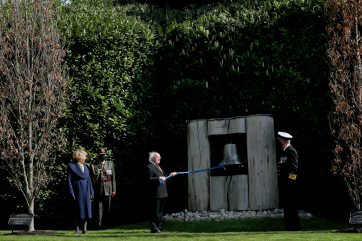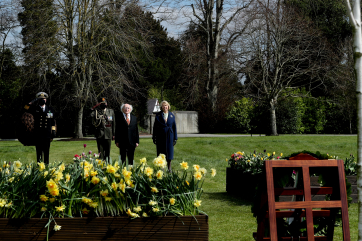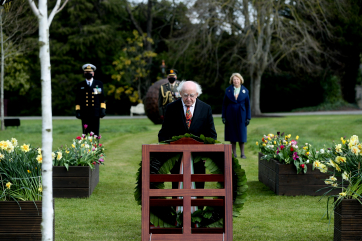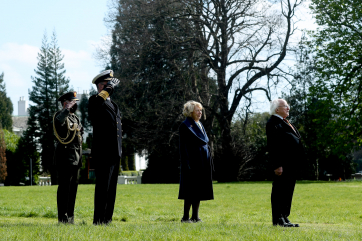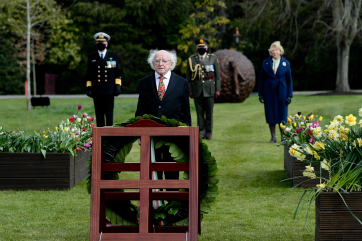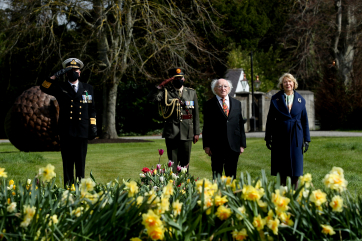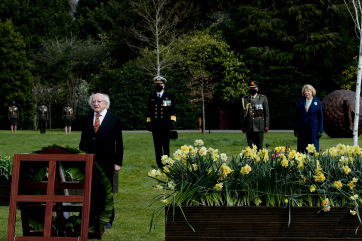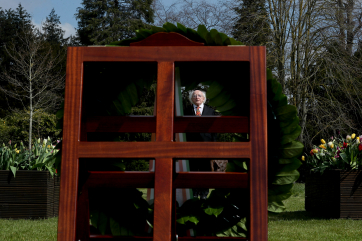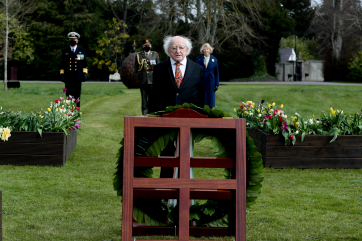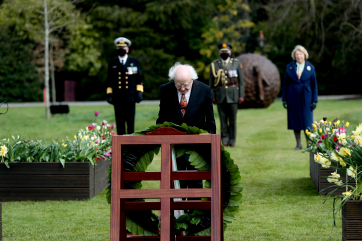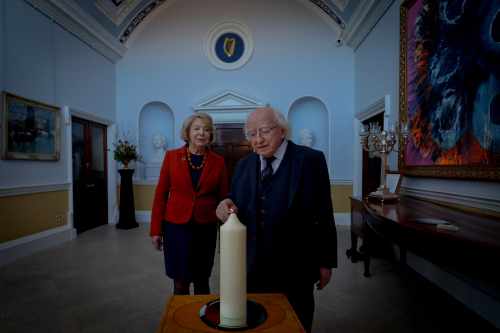Message for International Traveller & Roma Day
8 April 2021
As I send a message of solidarity as President of Ireland to all Travellers and Roma across Ireland, and indeed to those outside Ireland, on International Traveller and Roma Day, may I suggest that, yes, it is necessary to reflect with a sense of achievement as to what has been won, but also – and it is more important – to reflect critically and with resolve on those issues which we have faced and on which we continue to fail. In that respect, today is an important day when we recall the first World Roma Congress in London 50 years ago.
The purpose of this annual event, since 1971, has been to create an advocacy platform and to develop strategies that might address the racism and neglect being experienced by Roma and Travellers, an issue which sadly remains with us today, despite many advances for both communities over the past decades.
Far too many challenges remain for Travellers and Roma. The bitter fruits of a failure of State policy are manifold, where it existed. Submission to narrow, exclusionary, property-based, and most unrepublican populist sentiments, in far too many Local Authorities, stand as indictments on Irish society past and present. Our failure for so long to address, with compassion and understanding, the needs of the Travelling community has of course been recognised recently as a failure to meet our obligations, including those under the European Social Charter.
The statistics are appalling in terms of what has persisted as exclusion. Today, only 14 percent of Traveller women have completed secondary education, compared to 83 percent in the general population. Some 60 percent of Traveller men have not progressed beyond primary level in education. This is compared to 13 percent in the general population.
Yes, it is true that the number of Travellers with third-level qualifications has doubled in the last number of years, and that is to be welcomed – what a great achievement it is, ground-breaking and exemplary – but this represents just over a half of one percent of the Traveller population. The figure for the general population with third-level qualifications is now 47 percent.
Any general population, with a concept of citizenship and justice, should be concerned at the significant proportion of their fellow citizens from special groups that are being regularly excluded, generation after generation.
The failure to achieve a full participation, while respecting the features of a recognised ethnic group, should concern us all. It has had results in every area of contemporary Irish society.
Male members of the Travelling community are ten times more likely to be in the prison system, while females are up to twenty times more likely. Unemployment among Travellers remains at multiple levels of the State average. Life expectancy for Travellers is at least ten years lower than the general population. Infant mortality is considerably higher, and Traveller men are over six times more likely to die by suicide than men in the general population.
Following years of marginalisation and poor living conditions, Travellers continue to experience higher levels of chronic disease such as asthma, stroke, heart disease and respiratory disease, making them in our present conditions so much more vulnerable to COVID-19.
Overcrowding in housing remains prevalent, even amongst settled Travellers. Approximately 3,000 Travellers live in unofficial sites or on the side of the road without access - in 2021 - to running water, electricity and toilets. This makes current advice as to self-isolation and handwashing so much more difficult.
We have not all suffered COVID-19 equally. It is now accepted that poor people have suffered disproportionally from the pandemic. Among those poor, Roma and Travellers have been even further impacted. We are well past the time for achieving improvements in the conditions of Roma and Traveller communities. Is it not time to look at the obstacles – avoidable obstacles – to the advancement of these communities in the education system and the structural inequalities that impede Traveller and Roma citizens from the achievement of full and inclusive participation in our Republic? Let us accept that we are dealing with rights issues. On such an important issue, surely a political consensus is not only desirable, but achievable.
Despite all of the obstacles that I have noted, we must remember that both the Traveller and Roma communities are resilient communities whose daily lives are often about overcoming adversity – exclusion, poor living conditions, poor mental health, discrimination and racism. The relatively recent decision by the State to acknowledge the Traveller community as an indigenous ethnic minority has indeed helped to unlock, to a considerable extent, an ingrained systemic mindset, but we need to see changes in policy at local as well as State level.
There are so many documents, over the years and more recently, from which can be drawn policies. The excellent 2017 Report on Traveller Ethnicity by the Joint Oireachtas Committee on Justice and Equality secured the Government acknowledgement that we had been working for so long to achieve.
This declaration, and acknowledgement of the duty that flows from it on how policy matter should re-interpret legislation in relation to Travellers’ rights, is strengthened in the Government’s acceptance of the Report. It acknowledges the discrimination that has been experienced by Travellers by members of a society willing to view them as a group living on the margins of the settled community, rather than a distinct ethnic group that has existed in Ireland since long before the years of the Great Irish Famine.
During this global health emergency, where we all have been asked to make changes to protect our communities, we must take the opportunity to celebrate our shared humanity, be it close to us or far from us in distance. In this regard, I encourage all Travellers and members of the Roma community to ensure they avail of the COVID vaccination as it is offered to them. The emergence of safe, effective and affordable vaccines provides vital hope of overcoming COVID-19. The pandemic has reminded us all of the extent to which our lives on this, our shared planet, are intertwined, having illustrated how we need to work together to face global challenges that threaten our very existence.
If we are to live together in harmony, we must work together to understand and respect each other. In recent years we have been making efforts towards building a society that values and embraces diversity, one in which we seek tolerance in our attitudes to each other and how we choose to lead our lives. I hope that, as a society, we, and all our fellow citizens across the settled and Traveller communities, can also find within us the resolve, the imagination, and generosity of spirit that are required to make those accommodations for each other, that are required if all of us are to vindicate our rights as citizens and to be true to our heritage, in all of its rich manifestations. Neither must our cultures and their assumptions be used to prevent or reduce personal rights.
So today, as we celebrate the unique culture of the Traveller and Roma communities, and the role that culture has played in the shared memory of a nation, we remind ourselves especially of the vital role that Travellers have traditionally played, and continue to play, in our society and of the positive contribution their culture has made over centuries to Irish society – in music, song, crafts, and all areas of culture.
As we honour and mark the Travelling Community’s journey, let us resolve that this journey in the future will be one with differences respected, but that it will also be a shared journey, for all Irish citizens, during which we will ensure that none are excluded, denied a voice in society, or rightful access to vital services, or ever be exposed to any unfair or ill-informed prejudice or discrimination, which we all have a duty to recognise, confront and seek to eliminate, as it reduces us all. Let us celebrate together, and with resolve, International Traveller and Roma Day.
Beir beannacht.

